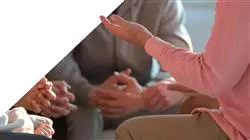University certificate
The world's largest faculty of medicine”
Why study at TECH?
Get up to date on the latest methods for overcoming addictions to psychostimulants with this demanding Hybrid professional master’s degree”

In this Hybrid professional master’s degree proposal, with a professionalizing nature and blended learning modality, the program is aimed at updating professionals who require a high level of qualification. The contents are based on the latest scientific evidence, and oriented in a educational way to integrate practice, and the theoretical-practical elements will facilitate the updating of knowledge and will allow decision making in the
patient management.
Thanks to its multimedia content developed with the latest educational technology, they will allow the health professional to learn in a contextual and situated learning environment, i.e., a simulated environment that will provide immersive learning programmed to train in real situations.
This program is designed around Problem-Based Learning, whereby the professional must try to solve the different professional practice situations that arise throughout the program. For this purpose, the students will be assisted by an innovative interactive video system created by renowned and experienced experts.
Get to update your theoretical knowledge on the management of addictions to gambling, Internet and new technologies, throughout the 1,500 teaching hours that make up the first phase of this program”
This Hybrid professional master’s degree in Cognitive-Behavioral Treatment of Addictions contains the most complete and up-to-date scientific program on the market. The most important features include:
- Development of more than 100 clinical cases presented by expert medical professionals in the Cognitive-Behavioral Treatment of Addictions. The graphic, schematic, and practical contents with which they are crea ted, provide scientific and practical information on the disciplines that are essential for professional practice
- Comprehensive systematized action plans for the main pathologies
- Presentation of practical workshops on procedures diagnosis, and treatment techniques
- An algorithm-based interactive learning system for decision-making in the clinical situations presented throughout the course
- Practical clinical guides on approaching different pathologies
- All this will be complemented by theoretical lessons, questions to the expert, debate forums on controversial topics, and individual reflection assignments
- Content that is accessible from any fixed or portable device with an Internet connection
- Furthermore, you will be able to carry out a clinical internship in one of the best hospital centers
Over the course of a 3-week clinical internship, you will provide care and therapeutic intervention strategies for patients with various addictions such as excessive alcohol consumption”
In this Hybrid professional master’s degree proposal, with a professionalizing nature and blended learning modality, the program is aimed at updating professionals who require a high level of qualification. The contents are based on the latest scientific evidence, and oriented in a educational way to integrate practice, and the theoretical-practical elements will facilitate the updating of knowledge and will allow decision making in the patient management.
Thanks to its multimedia content developed with the latest educational technology, they will allow the health professional to learn in a contextual and situated learning environment, i.e., a simulated environment that will provide immersive learning programmed to train in real situations. This program is designed around Problem-Based Learning, whereby the professional must try to solve the different professional practice situations that arise throughout the program. For this purpose, the students will be assisted by an innovative interactive video system created by renowned and experienced experts.
This program is designed to take you to the forefront of therapy and is a great opportunity to consolidate your professional practice”

Update all your skills in a theoretical and practical way with a rigorous and demanding program adapted to the needs of practical improvement required by your daily medical practice”
Teaching Planning
The syllabus of this Hybrid professional master’s degree is made up of various academic modules where different clinical manifestations of addictions are addressed. In particular, the syllabus reviews the latest scientific discoveries about the neuromodulators involved in dependence on substances such as drugs, alcohol and tobacco. It also takes a close look at therapeutic strategies against these harmful habits. All these subjects are taught from a 100% online and interactive platform. To consolidate the knowledge of the contents, the professional will rely on methods of great didactic value, such as Relearning.

In all the modules of this program, TECH will provide you with videos, infographics and other multimedia resources of a pedagogical nature, in addition to the corresponding theoretical guides”
Module 1. Up-to-date classification of addictions and their basic concepts
1.1. Situation of Drugs at the International Level
1.2. Epidemiology of Addictions
1.3. Neurobiology of Addiction
1.4. Psychosocial Factors Related to Addictions
1.5. Legislation and Legal Aspects BORRAR
1.6. The Role of the Psychologist in the Treatment of Addictions
1.7. Classification of Substances Which Lead to Addiction
1.8. Basic concepts in addictions: use, abuse. Dependence, tolerance, abstinence, Craving, polyconsumption
1.9. Classification of Disorders Related to Substance Abuse and Addictive Disorders
1.10. Classification of Non-Substance-Related Addictive Disorders
1.11. Comorbidity and Dual Pathology
Module 2. Assessment, Prevention and Psychological Treatment in Addictions
2.1. Assessment of the Physical Field and General State of Health
2.2. Assessment Through Laboratory Tests
2.3. Assessment of Neuropsychological Aspects
2.4. Assessment of Personality and Its Disorders
2.5. Assessment of Mental State and Its Disorders
2.6. Assessment of the Severity of Addiction to Substances
2.7. Assessment of the Severity of Addiction Not Related to Substances
2.8. Assessment of Psychosocial Aspects
2.9. Prevention of Addictions
2.10. Principles to Follow in the Treatment of Addictions
2.11. Therapeutic Objectives in the Treatment of Addictions and Motivation Towards Change
2.12. Transtheoretical Model
2.13. Cognitive-Behavioural Treatment: Commonly Used Techniques
2.14. Treatment Oriented Towards the Family
2.15. Group Therapy
2.16. Other Focuses of Treatment
2.17. Care Resources and Devices and Addiction Treatment
Module 3. Cognitive-Behavioral Treatment of Tobacco Addiction
3.1. Social Concept of Tobacco
3.2. Classification of Problems Related to Tobacco
3.3. Impact and Effect of Tobacco on Health
3.4. Neurobiology of Addiction to Tobacco
3.5. Tobacco Consumption Problems
3.6. Psychological Evaluation in Smoking
3.7. Medical Treatment
3.8. Psychological Treatment: Cognitive-Behavioural Treatment
3.9. Other Therapeutic Interventions and Types of Intervention Programs
3.10. Psychological Intervention in Adolescents
3.11. Approach to Other Pathologies Present in Addiction to Tobacco
3.12. Prevention of Relapses and Maintaining Results
Module 4. Time-Limited Psychotherapy Intervention in Smoking
4.1. Historical and Social Aspects
4.2. Prevalence of Tobacco Consumption in Spain BORRAR
4.3. Figures Worldwide
4.4. The Consumption of Tobacco and Health
4.5. Tobacco Bias and Explanatory Models of Smoking Behavior
4.6. Tobacco and Psychopathology
4.7. Tobacco and Schizophrenia
4.8. Alcohol and Tobacco
4.9. Smoking Treatment
4.10. Biological Treatment of Abstinence Syndrome
4.11. Behavioral Treatment of Smoking
4.12. Treatment With Time-Limited Psychotherapy (TLP) © ®
4.12.1. Interpersonal Moment of Intervention With TLP
4.12.2. Intrapersonal Moment of Intervention With TLP
4.13. A Real Case is Worth More Than a Thousand Explanations
Module 5. Cognitive-Behavioral Treatment of Alcohol Addiction
5.1. Definition and Classification of Alcoholic Drinks
5.2. Classification of Problems Related to Alcohol
5.3. Impact and Effect of Alcohol on Health
5.4. Neurobiology of Addiction to Alcohol
5.5. Disorders Related to Alcohol
5.6. Psychological Evaluation in Alcohol Addiction
5.7. Medical Treatment
5.8. Psychological Treatment: Cognitive-Behavioural Treatment
5.9. Other Therapeutic Interventions and Types of Intervention Programs
5.10. Psychological Intervention in Adolescents
5.11. Approach to Other Pathologies Present in Addiction to Alcohol
5.12. Prevention of Relapses and Maintaining Results
Module 6. Cognitive-Behavioral Treatment of Cannabis Addiction
6.1. Current Beliefs on Cannabis
6.2. Cannabis and Ways of Consuming It
6.3. Impact and Effect of Cannabis on Health
6.4. Neurobiology of Addiction to Cannabis
6.5. Disorders Related to Cannabis
6.6. Psychological Evaluation in Cannabis Addiction
6.7. Medical Treatment
6.8. Psychological Treatment: Cognitive-Behavioural Treatment
6.9. Other Therapeutic Interventions and Types of Intervention Programs
6.10. Psychological Intervention in Adolescents
6.11. Approach to Other Pathologies Present in Addiction to Cannabis
6.12. Relapse Prevention and Maintenance
Module 7. Cognitive-behavioral treatment of addiction to psychostimulants: cocaine, amphetamines and synthetic drugs
7.1. Classification of Psychostimulant Substances
7.2. Ways of Consuming Psychostimulants
7.3. Impact and Effect of Psychostimulants on Health
7.4. Neurobiology of Addiction to Psychostimulants
7.5. Disorders Related to Psychostimulants
7.6. Psychological Evaluation in Psychostimulants Addiction
7.7. Medical Treatment
7.8. Psychological Treatment: Cognitive-Behavioural Treatment
7.9. Other Therapeutic Interventions and Types of Intervention Programs
7.10. Psychological Intervention in Adolescents
7.11. Approach to Other Pathologies Present in Addiction to Psychostimulants
7.12. Prevention of Relapses and Maintaining Results
Module 8. Cognitive-behavioral treatment of heroin and morphine addiction
8.1. Classification of Opiates and Opioids
8.2. Ways of Consuming Opiates and Opioids
8.3. Impact and Effect of Heroin and Morphine on Health
8.4. Neurobiology of Addiction to Heroin and Morphine
8.5. Disorders Related to Opiates
8.6. Psychological Evaluation in Opiates Addiction
8.7. Medical Treatment
8.8. Psychological Treatment: Cognitive-Behavioural Treatment
8.9. Other Therapeutic Interventions and Types of Intervention Programs
8.10. Psychosocial Intervention in Special Populations
8.11. Approach to Other Pathologies Present in Addiction to Opiates
8.12. Prevention of Relapses and Maintaining Results
Module 9. Treatment of Addictions With No Substances: Pathological Gambling, The Internet, New Technology, Emotional Dependency
9.1. Pathological Gambling and Addiction to New Technology
9.2. Classification of Problems Related to Gambling and New Technologies
9.3. Impact and Effect of Non-Substance-Related Addictions on Health
9.4. Evaluation of Addictions Not Related to Substances
9.5. Non-Substance-Related Disorders
9.6. Psychological Evaluation in Addictions to Gambling and New Technologies
9.7. Medical Treatment and Psychological Treatment: Cognitive-- Behavioural Treatment
9.8. Treatment With Time-Limited Psychotherapy
9.9. Psychological Intervention in Adolescents
9.10. Approach to Other Pathologies Present in Addiction Not Related to Substances
9.11. Prevention of Relapses and Maintaining Results

In this theoretical phase, you will not have to worry about pre-established schedules or continuous evaluation chronograms. You will be free to set the pace of your progress at any time”
Hybrid Professional Master’s Degree in Cognitive-Behavioral Treatment of Addictions
TECH Global University presents the Hybrid Prfofessional Master's Degree in Cognitive-Behavioral Addiction Treatment for Physicians, a unique opportunity to specialize in a field of vital importance in the field of health. Become an expert in addressing addictions and help transform lives. In today's society, addictions represent a significant challenge that affects a large number of people and requires trained professionals to provide comprehensive and effective treatment. Our Master's program provides you with the theoretical knowledge and practical skills necessary to become a clinician specializing in the cognitive-behavioral treatment of addictions. The Hybrid Prfofessional Master's Degree in Cognitive-Behavioral Addiction Treatment for Physicians will provide you with a solid scientific and clinical foundation to approach addictions from a holistic perspective. You will be able to apply evidence-based therapeutic techniques, identify risk and protective factors, and promote prevention and recovery for people affected by addictions.
Combine the best of both modalities
The blended mode of our program combines the flexibility of online learning with face-to-face interaction and practice. Through our virtual platform, you will have access to cutting-edge teaching materials, live lectures and interactive activities that will allow you to acquire the theoretical foundations necessary to understand the basics of addictions and the most effective cognitive-behavioral intervention strategies. At TECH Global University, we are proud to have a faculty of highly qualified professors who will guide you in your learning process and provide you with a complete and updated vision of the cognitive-behavioral treatment of addictions. You will learn to assess, diagnose and design personalized treatment plans, focused on the individual needs of each patient. Don't miss the opportunity to excel in a growing field and contribute to people's health and well-being. Enroll in the Hybrid Prfofessional Master's Degree in Cognitive-Behavioral Addiction Treatment for Physicians at TECH Global University and acquire the skills you need to make a difference in the lives of your patients.







